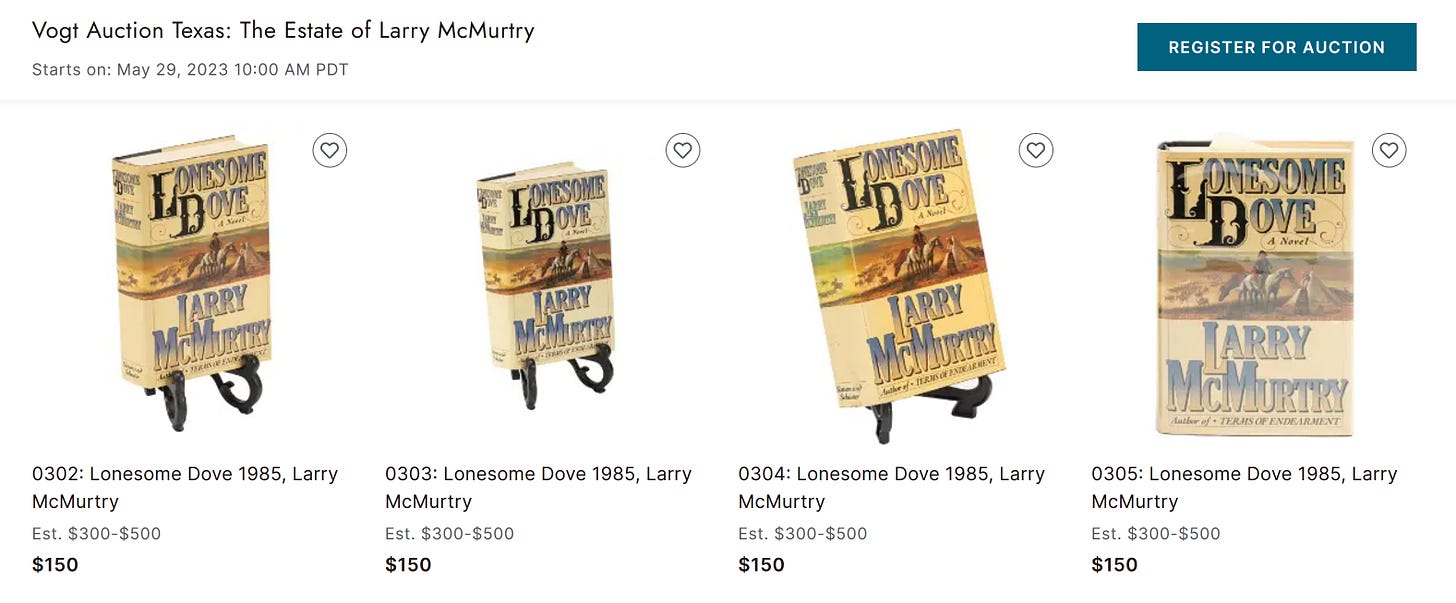Auction Buyers Beware & SF/F New Arrivals
Thought's on Larry McMurtry's "estate" auction and a new list of 25 science fiction & fantasy titles.
New Science Fiction & Fantasy List
This week’s new arrivals list is devoted to Science Fiction and Fantasy. I just added twenty-five newly catalogued books to my website.
Observations on Larry McMurtry’s Estate Auction
Larry McMurtry’s novel Cadillac Jack is well-known among booksellers for the title character’s mantra, “anything can be anywhere.” This guiding principle keeps book collectors and booksellers constantly on the hunt. One of my greatest finds came out of a mundane estate sale.
I had piled up a good number of books and prints for my shop, and when I went to pay the fellow running the sale said, “Here, you might know what to do with this.” He added a small roll of paper to my purchases. “No charge.” It turned out to be an original Peanuts daily comic strip drawing by Charles Schulz, and by far the best thing I’ve ever got for free. And I did know what to do with it. I sold it for $8,000. Anything can truly be anywhere.
I re-read Cadillac Jack during the pandemic, and it was not the antique-picker novel I remembered. At its heart, it is a novel about well-meaning people in dysfunctional romantic relationships. Those well-meaning people are in the antiques world in Washington, D.C. The DC part of the novel reminded me a bit of Under the Volcano, which is about a desultory minor diplomat in Mexico. McMurtry’s DC isn’t so different, there’s just less mescal.
Much of the antiquing in Cadillac Jack takes place in auction rooms. Auctions interested McMurtry for most of his life—there’s even an auction scene in his first book, Horseman Pass By, published in 1961. In Cadillac Jack, the auctions in Washington, DC, are attended either by bored federal employees looking for a hit of adrenaline during their lunch breaks or by crowds of uninformed bidders willing to pay too much.
“The crush and competition of the auction turned them on; all that greed is sexy,” McMurtry wrote. “Their eyes would glow with passionate lights when they triumphantly secured, for five or six hundred dollars, some object any competent dealer would have sold them for two twenty-five.”
In an hour (High Noon on Memorial Day in Texas), Vogt Auction Galleries in San Antonio is going to put McMurtry’s observation to the test, and they will use McMurtry’s own stuff to do it. McMurtry, for those of a younger generation, was a well-known antiquarian bookseller. He also won the Pulitzer Prize for his novel Lonesome Dove and an Oscar for his screenplay of Brokeback Mountain. So the floor rugs from his house might attract more interest than the average used Texas carpet. Or so the auction house’s thinking goes.
Vogt Auction Galleries came up with a stirring logo and produced a video tour inside McMurtry’s house to promote the sale. They also got lots of press, including a story in Texas Monthly that coincided with the opening of online bidding at the McMurtry’s estate sale on May 1. At the time, 300 items were listed.
Nine days before the auction, Vogt Auction Galleries sent out an email with the subject line, “New items added: The Estate of Larry McMurtry.”
That’s interesting, I thought. I wonder what else they’ve added. It turns out, they added 667 items from the homes of random Texans. The Larry McMurtry “Estate” Sale is now just 31% Larry McMurtry by volume.
To be sure, the auction house has covered itself—they added a note that Larry McMurtry’s estate is just the first 300 items to the sale description. They put that sentence into the middle of a paragraph about Larry McMurtry. The adjective “buried” might come to mind. But they did not change the sale logo, the title of the sale, or the subject lines of their emails marketing the “Estate of Larry McMurtry,” none of which make obvious that the auction is mostly not McMurtry’s stuff anymore.
With auctions, it’s always a good idea to read the fine print.
Online bidders have become very important to auction houses, and now most sales are marketed with photos and descriptions to attract a retail audience, both on the auctioneers’ own websites and on third-party platforms like LiveAuctioneers and Invaluable.
But auctions remain basically the same—all sales are final, descriptions are not guaranteed, and if you don’t come in person to look, it’s your own fault if you aren’t happy with your purchase.
Both collectors and dealers learn this the hard way. If you’ve bought at very much at auction, you have probably received items were incomplete or learned the expensive lesson that sometimes photos cleverly obscure some major fault. I know a book dealer who buys heavily at auction and tosses out 10% of his purchases. It’s the cost of doing business (or collecting books direct from the source).
Of course, the auction houses would change if their customers insisted on better descriptions, but as McMurtry observed, greed is sexy, and regular auction buyers succumb to the temptation again and again (yours truly being no exception).

I would not be surprised if Vogt Auctions gets complaints from people who “triumphantly secure”, to use McMurtry’s phrase, a copy of Lonesome Dove for twice the going price only to realize later that it wasn’t from Larry McMurtry estate after all.
Neither Cadillac Jack nor the Larry McMurtry would be surprised by that outcome.
*
If you are interested in books from McMurtry’s library, there is another source that does take returns, if something isn’t satisfactory.
InkQ Rare Books has some 1600 boxes of books from McMurtry’s library in a Dallas warehouse, and they are beginning to offer them to the public. Email info.inkqnabula@gmail.com and ask to be put on their mailing list.




